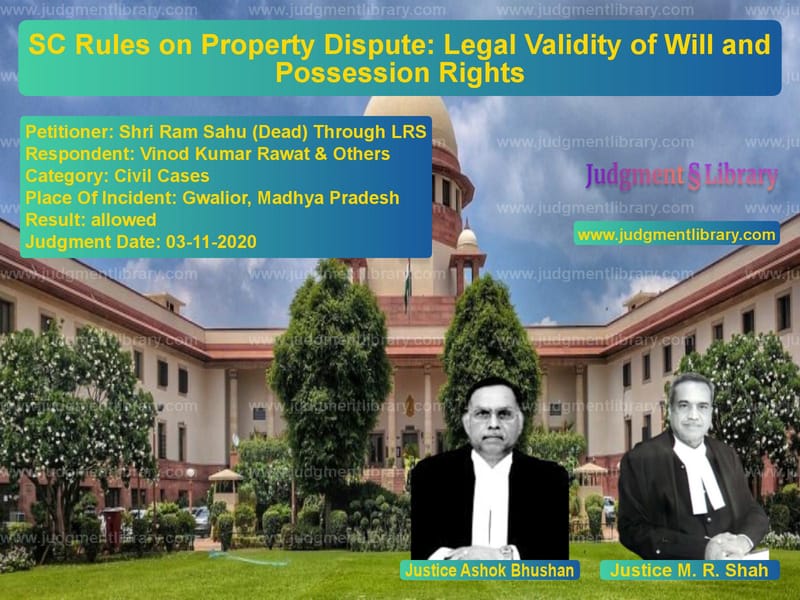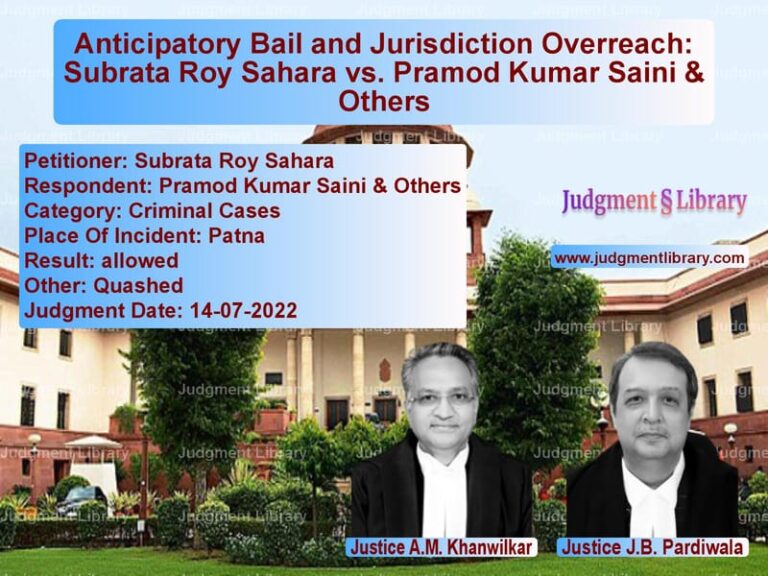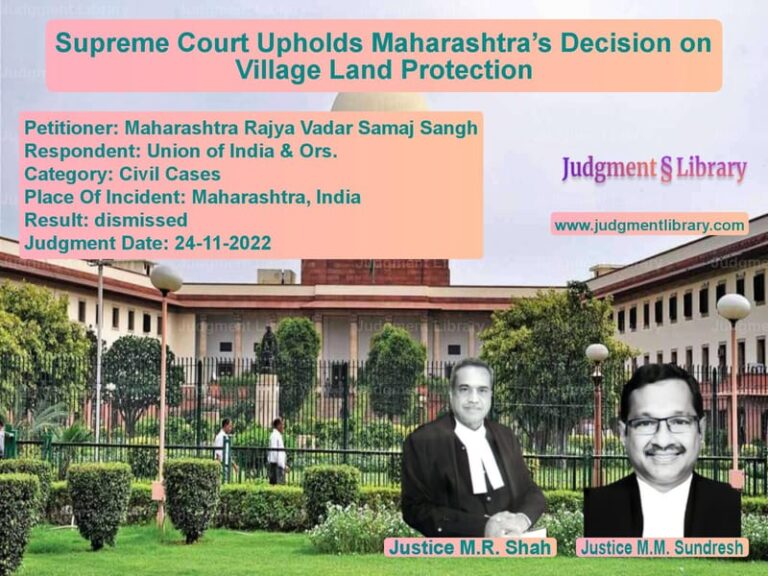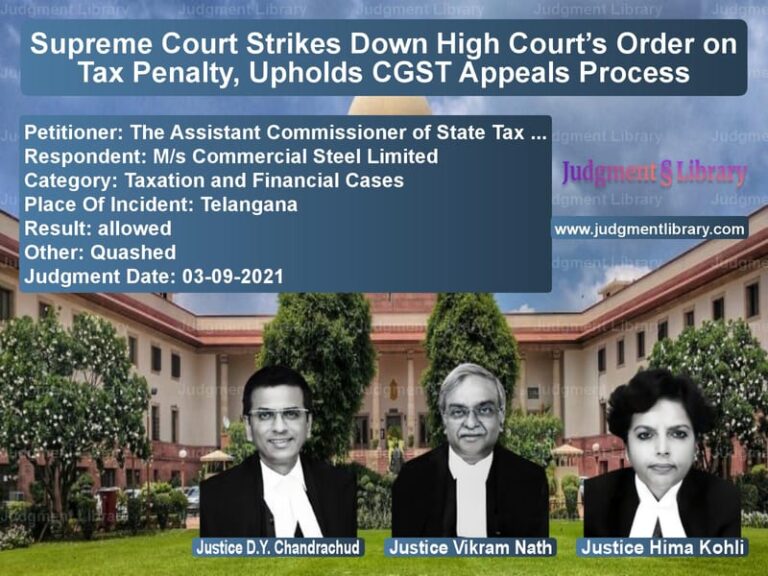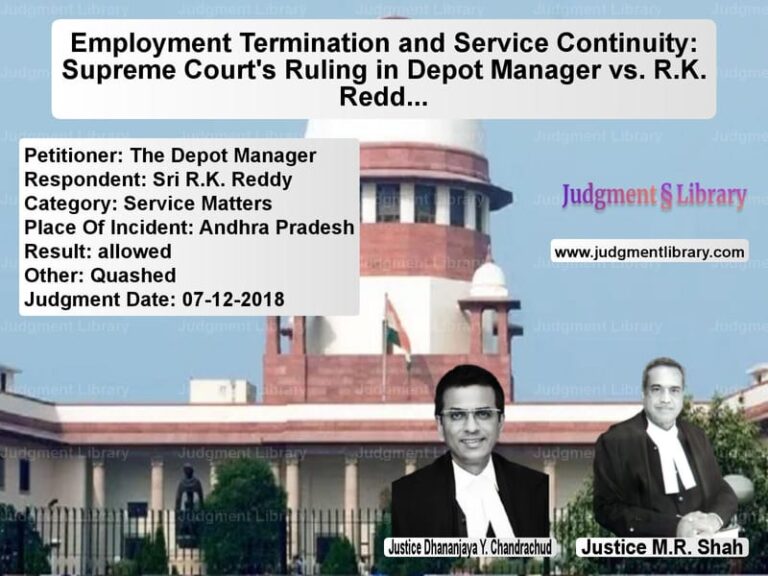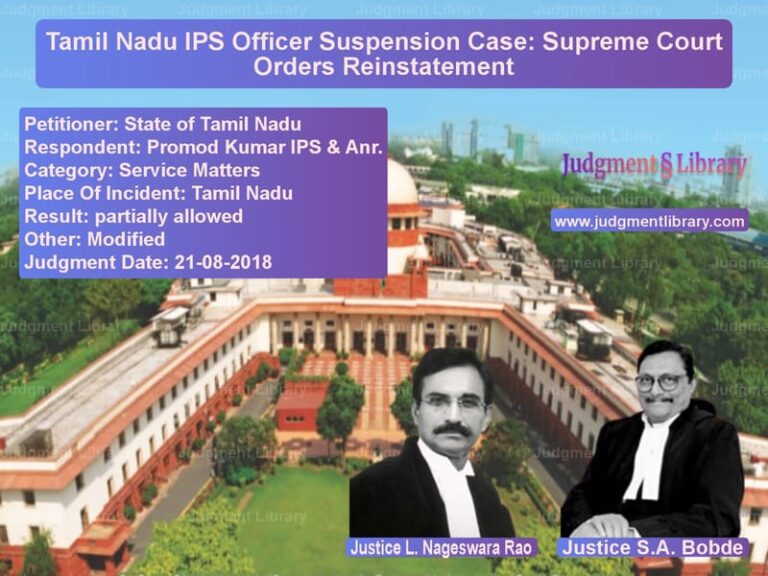SC Rules on Property Dispute: Legal Validity of Will and Possession Rights
The Supreme Court of India, in the case of Shri Ram Sahu (Dead) Through LRS vs. Vinod Kumar Rawat & Others, addressed a significant legal dispute concerning the ownership and possession of a property in Gwalior, Madhya Pradesh. The case involved issues related to the validity of a will, adoption claims, and the rightful owner of a house located at Sube Ki Payga, Jiwajiganj, Lashkar.
The judgment provided clarity on key legal principles, including the enforceability of a will, the burden of proof in adoption cases, and the importance of possession rights. This ruling has implications for property disputes across India where claims arise based on multiple legal documents and competing narratives.
Background of the Case
The dispute stemmed from a conflict over property ownership following the death of Chhimmabai, the original owner. The appellant, Shri Ram Sahu, asserted that Chhimmabai had executed a will in his favor on October 19, 1993, bequeathing him the disputed property. However, the respondents contended that Chhimmabai had adopted Defendant No.3 and had executed a registered Adoption Deed on May 13, 1992. Consequently, Defendant No.3, claiming to be the legal heir, sold the property to Respondents No.1 and 2 through a sale deed executed on March 25, 1995.
The trial court ruled in favor of the respondents, dismissing the claims of the appellant. The first appellate court (High Court of Madhya Pradesh) upheld the decision but made crucial observations regarding the possession of the property. The appellant then moved the Supreme Court, challenging the lower court’s findings.
Key Legal Issues
- Whether the sale deed executed by Defendant No.3 was legally valid?
- Whether the will in favor of the appellant was enforceable in law?
- Whether the alleged adoption of Defendant No.3 was legally recognized?
- Whether the appellant had rightful possession of the disputed property?
Arguments by the Appellant
The appellant’s legal counsel put forth the following arguments:
- The will executed by Chhimmabai in 1993 was legally valid and should override any competing claims.
- The adoption of Defendant No.3 was fraudulent and did not comply with the legal requirements under the Hindu Adoption and Maintenance Act.
- The sale deed executed by Defendant No.3 was illegal because he was not the rightful owner of the property.
- The High Court had already recognized the appellant’s possession rights in its initial judgment, and the review of that finding was erroneous.
- Any review of the findings on possession was beyond the scope of Order 47 Rule 1 of the Civil Procedure Code (CPC).
Arguments by the Respondents
The respondents countered these arguments with the following contentions:
- The sale deed executed in favor of Respondents No.1 and 2 was based on legal ownership acquired through adoption.
- The adoption of Defendant No.3 was legally valid and properly registered.
- The appellant’s claim of possession was fabricated, and he was merely a trespasser.
- The High Court’s review was necessary to correct an apparent error in its initial judgment.
Supreme Court’s Observations
The Supreme Court analyzed the evidence and legal principles applicable to the case. It made the following key observations:
1. Validity of the Will
The Court held that a will must be executed with free consent and attested as per the requirements of the Indian Succession Act. In this case, the respondents failed to prove that the will was forged or executed under coercion.
“The burden of proving that a will was not executed freely lies on the party challenging its validity. In the absence of strong evidence to the contrary, the document must be given due legal weight.”
2. Legality of Adoption
The Court reiterated that adoption must follow specific legal formalities, including the consent of biological parents and performance of religious rites.
“Mere execution of an adoption deed is not sufficient to establish legal adoption. The respondents have failed to prove that all legal formalities were followed.”
3. Review Jurisdiction Under Order 47 Rule 1 CPC
The Court found that the High Court’s review order, which deleted the observations regarding possession, was unjustified.
“Review jurisdiction is limited to correcting errors apparent on the record. The High Court exceeded its jurisdiction by re-evaluating factual findings already settled.”
4. Possession Rights
The Court noted that the respondents had previously filed a possession suit against the appellant, thereby admitting his possession.
“Possession must be determined based on evidence. Since the respondents previously sought an injunction against the appellant’s possession, they cannot later deny it.”
Final Judgment
The Supreme Court ruled as follows:
- The appellant’s possession rights over the disputed property were upheld.
- The High Court’s review order was quashed, and the initial findings on possession were restored.
- The respondents’ claims regarding the adoption and subsequent sale deed were dismissed.
- The sale deed in favor of Respondents No.1 and 2 was declared null and void.
Conclusion
This judgment is significant in reaffirming the principles governing wills, adoptions, and property possession. The Supreme Court emphasized that procedural fairness must be maintained in review petitions and that possession rights should not be disturbed without proper legal grounds. The ruling ensures that individuals relying on legally executed wills are protected from fraudulent claims based on fabricated adoption deeds.
Petitioner Name: Shri Ram Sahu (Dead) Through LRS.Respondent Name: Vinod Kumar Rawat & Others.Judgment By: Justice Ashok Bhushan, Justice M. R. Shah.Place Of Incident: Gwalior, Madhya Pradesh.Judgment Date: 03-11-2020.
Don’t miss out on the full details! Download the complete judgment in PDF format below and gain valuable insights instantly!
Download Judgment: Shri Ram Sahu (Dead) vs Vinod Kumar Rawat & Supreme Court of India Judgment Dated 03-11-2020.pdf
Direct Downlaod Judgment: Direct downlaod this Judgment
See all petitions in Property Disputes
See all petitions in Succession and Wills
See all petitions in Specific Performance
See all petitions in Damages and Compensation
See all petitions in Contract Disputes
See all petitions in Judgment by Ashok Bhushan
See all petitions in Judgment by Mukeshkumar Rasikbhai Shah
See all petitions in allowed
See all petitions in supreme court of India judgments November 2020
See all petitions in 2020 judgments
See all posts in Civil Cases Category
See all allowed petitions in Civil Cases Category
See all Dismissed petitions in Civil Cases Category
See all partially allowed petitions in Civil Cases Category

